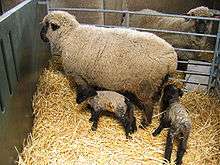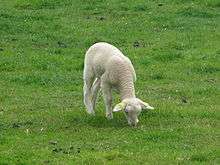Definify.com
Webster 1913 Edition
Lamb
Lamb
,Noun.
[AS.
lamb
; akin to D. & Dan. lam
, G. & Sw. lamm
, OS., Goth., & Icel. lamb
.] 1.
(Zool.)
The young of the sheep.
2.
Any person who is as innocent or gentle as a lamb.
3.
A simple, unsophisticated person; in the cant of the Stock Exchange, one who ignorantly speculates and is victimized.
Lamb of God
,
The Lamb
(Script.)
, the Jesus Christ, in allusion to the paschal lamb.
The twelve apostles of
– the Lamb
. Rev. xxi. 14.
Lamb’s lettuce
(Bot.)
, an annual plant with small obovate leaves (
Valerianella olitoria
), often used as a salad; corn salad. [Written also
– lamb lettuce
.] Lamb's tongue
, a carpenter's plane with a deep narrow bit, for making curved grooves.
Knight.
– Lamb's wool
. (a)
The wool of a lamb.
(b)
Ale mixed with the pulp of roasted apples; – probably from the resemblance of the pulp of roasted apples to lamb's wool.
[Obs.]
Goldsmith.
Lamb
,Verb.
I.
[
imp. & p. p.
Lambed
; p. pr. & vb. n.
Lambing
.] To bring forth a lamb or lambs, as sheep.
Definition 2026
Lamb
Lamb
See also: lamb
English
Proper noun
Lamb
- A surname.
Derived terms
Etymology 2
Proper noun
Lamb
- (Christianity) Jesus; the Lamb of God
- 1611, King James Bible, Revelation 12:10-11
- And I heard a loud voice saying in heaven, Now is come salvation, and strength, and the kingdom of our God, and the power of his Christ: for the accuser of our brethren is cast down, which accused them before our God day and night. And they overcame him by the blood of the Lamb, and by the word of their testimony; and they loved not their lives unto the death.
- 1611, King James Bible, Revelation 12:10-11
Synonyms
- (Jesus): Paschal Lamb, Lamb of God, Agnus Dei
lamb
lamb
See also: Lamb
English

A sheep and lambs.

A lamb.
Noun
lamb (plural lambs or (dialectal) lamber or (dialectal) lambren)
- A young sheep.
- The flesh of a lamb or sheep used as food.
- (figuratively) A person who is meek, docile and easily led.
- A simple, unsophisticated person.
- (finance, slang) One who ignorantly speculates on the stock exchange and is victimized.
Derived terms
Derived terms
Translations
young sheep
|
|
flesh of lamb as food
|
|
meek person
Verb
lamb (third-person singular simple present lambs, present participle lambing, simple past and past participle lambed)
- (intransitive) Of a sheep, to give birth.
- (transitive or intransitive) To assist (sheep) to give birth.
- The shepherd was up all night, lambing her young ewes.
Translations
of a sheep, to give birth
|
Anagrams
Faroese
Etymology
From Old Norse lamb, from Proto-Germanic *lambaz.
Noun
lamb n (genitive singular lambs, plural lomb)
Declension
| n8 | Singular | Plural | ||
| Indefinite | Definite | Indefinite | Definite | |
| Nominative | lamb | lambið | lomb | lombini |
| Accusative | lamb | lambið | lomb | lombini |
| Dative | lambi | lambinum | lombum | lombunum |
| Genitive | lambs | lambsins | lamba | lambanna |
Derived terms
- gimburlamb (female lamb)
- veðurlamb (male lamb)
Icelandic
Etymology
From Old Norse lamb, from Proto-Germanic *lambaz.
Pronunciation
- IPA(key): /lamp/
- Rhymes: -amp
Noun
lamb n (genitive singular lambs, nominative plural lömb)
- a lamb
Declension
declension of lamb
Derived terms
- launa lambið gráa
- ljúfur sem lamb
- vatna lömbum (compare the Old Norse krjúpa at keldu)
Old English
Alternative forms
Etymology
From Proto-Germanic *lambaz.
Noun
lamb n
Declension
Declension of lamb (strong z-stem)
Descendants
- English: lamb
Old Norse
Etymology
From Proto-Germanic *lambaz.
Noun
lamb n (genitive lambs, plural lǫmb)
- a lamb
Declension
Declension of lamb (strong a-stem)
Descendants
Old Saxon
Etymology
From Proto-Germanic *lambaz.
Noun
lamb n
Declension
Declension of lamb (strong z-stem)
| Singular | Plural | |
|---|---|---|
| nominative | lamb | lambiru |
| accusative | lamb | lambiru |
| genitive | lambes | lambirō |
| dative | lambe | lambirum |
| instrumental | — | — |
Descendants
- Low German: Lamm